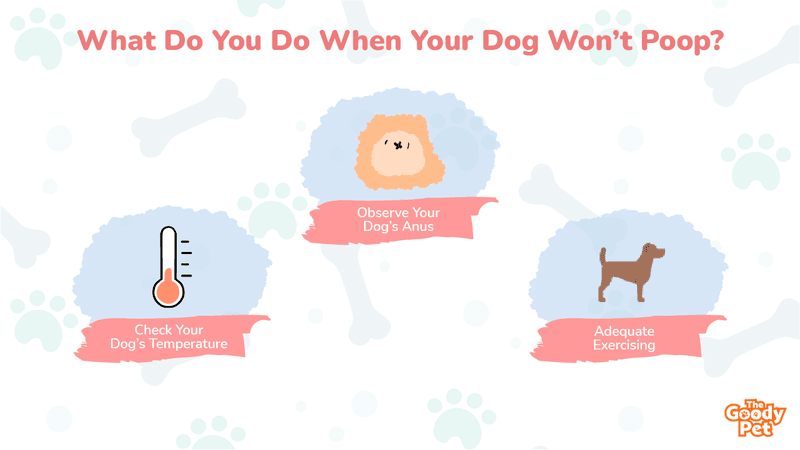While dogs may occasionally skip pooping for a day, the failure of a pooch to poop for two or more days running means its owner should sit up and pay closer attention, and rightfully so. Now, what are the possible reasons for your dog’s failure to poop?
Your dog may not be pooping because it has swallowed an indigestible object or because you’ve been feeding it meals that are lacking in fiber. In the same vein, elderly dogs are prone to suffering from constipation, and a pooch that hasn’t been getting enough exercise may find it difficult to poop.
Constipation in dogs can be dangerous if it isn’t detected early or left unattended. As a quick response to your dog’s failure to poop, you can bring relief to your pooch with certain natural home remedies or over-the-counter medication, which are discussed below. However, before going further, let’s examine the steps to take when you notice that your dog isn’t pooping.
What Do You Do When Your Dog Won’t Poop?
Check Your Dog’s Temperature
The first thing to do, immediately you notice your dog’s failure to poop, is to check the doggie’s temperature; This, you can do, by gently inserting a lubricated canine thermometer into the pooch’s anus.
The average dog body temperature is between 101 to 102.5°F.
And if you observe that your fido’s temperature is irregularly high, along with its constipation, the next point of action is to take the doggie to your vet for a medical checkup.
Observe Your Dog’s Anus
It can also help to check your doggie’s anal region for a potential glimpse of the substance causing a blockage. If you notice grass sticking out of your doggie’s anus, you can gently tug at the grass in a bid to pull it out.
Strings are more delicate to deal with, and you shouldn’t attempt to just pull one out from your dog’s anus, as you risk causing further damage; And, in this case, your dog will require professional medical attention.
Adequate Exercising
If it has been determined that your doggie’s constipation isn’t due to an underlying health condition, then encouraging your dog to partake in exercises can free its bowels, thereby making pooping easier.
Taking your dog for daily walks, or a good, old-fashioned game of fetch with the iFetch Interactive Ball Launchers for dogs both make for quality exercise and will go a long way in loosening your doggie’s bowels.
And if you’re too busy to play with your dog, don’t worry! The iFetch Launcher is fully automated, and your doggie can play with it on its own, for as long as it likes!
Pay More Attention To Your Dog’s Diet
A doggie suffering from constipation will benefit greatly from the inclusion of fiber supplements into its meals or a low residue diet plan. Additionally, you should resist the temptation to feed your dog bones, as they may be difficult to chew and digest.
Dogs are naturally very curious, and you may not always be around to prevent your dog from chewing stones and sticks; Hence, it is important that you teach your pooch that eating what you haven’t fed it, isn’t allowed.
Also, to help your doggie with its constipation, and prevent future occurrences, you should ensure that such a pooch has constant access to a fresh supply of clean water.
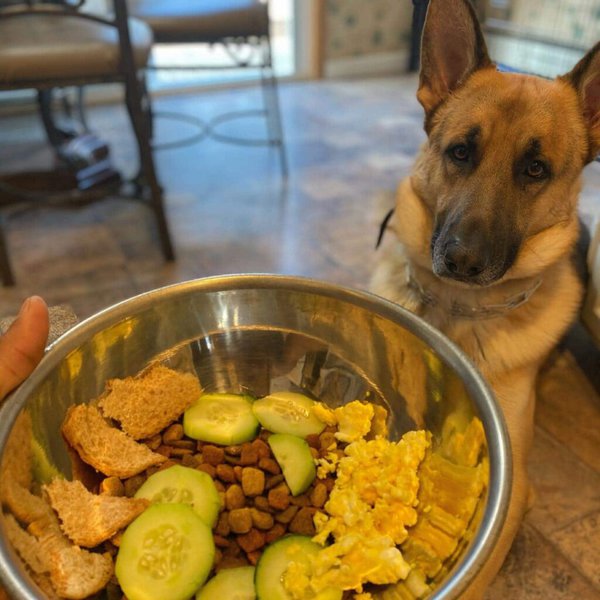
What Home Remedy Can I Give My Dog For Constipation?
If you notice that your dog is finding it difficult to poop, don’t worry! There are several home remedies you can give to aid a constipating dog, and these include:
Pumpkin
Top on the list of home remedies to feed a constipated dog is the fiber and moisture-rich pumpkin fruit. Pumpkin has been proven to be highly effective at easing mild constipation in dogs, and one to four tablespoons of freshly pureed pumpkin per day will go a long way in loosening your dog’s bowels.
And if you’re unsure of how to incorporate pumpkin into your doggie’s diet, Libby’s 100% pure pumpkin cans provide a ready solution to your dilemma. The Libby Cans provide a good source of fiber for your pooch, and even better, are formulated only from all-natural products.
Milk
Milk or milk-based products, such as yogurt, fed to a pooch in small quantities can also help relieve constipation in dogs that aren’t lactose intolerant, and this makes for a good, natural laxative.
However, as earlier inferred, you need to be very sure that your dog isn’t lactose intolerant or allergic to milk, before attempting to treat its constipation with dairy products.
Olive Oil
Also, if you have olive oil at home, you can try mixing a little into a constipated dog’s dish to make elimination significantly easier for such a doggie.
Take care not to add too much olive oil to your dog’s food, though, as this may result in diarrhea – We recommend half a teaspoon of olive oil for small dogs and two teaspoons for large dogs till the constipation is relieved.
Oatmeal
High-quality dog food that contains oatmeal is a great source of fiber, and it makes for an effective treatment option for doggies suffering from mild constipation.
However, when treating your dog’s constipation with oatmeal, ensure to do this with healthy amounts, as excessive oatmeal in a doggie’s diet can lead to the development of health issues.
Banana
Bananas are great fruits with lots of health benefits, and one of these is the treatment of constipation in dogs; This is made possible by the high fiber content present in bananas, which helps move food along a doggie’s intestinal tract.
Dogs can be regularly fed bananas as treats, but because of the high sugar content, this should be done in moderation. Generally, half a banana per day is okay for large dogs, while smaller dogs will do well with two or three small pieces of bananas per day.

What Over-The-Counter Meds Can You Give A Dog For Constipation?
If you desire relatively faster solutions to your dog’s constipation, then you can try any of the widely available medications used to treat pooping difficulties in canines; These medications include:
Laxatives
Canine laxatives work by stimulating bowel movements, thereby loosening up the stool and facilitating its easy passage. And one of the most common dog laxative products you can use for your constipating pooch is Dulcolax.
Dulcolax, also known as Bisacodyl, works like a typical laxative by stimulating movement within a doggie’s bowels to relieve constipation. And apart from Bisacodyl, other stimulants that may be prescribed for a constipating dog include Cisapride and Tegaserod.
For no reason should you treat your dog’s constipation with human laxatives, as this will only end up making things worse and put your furry friend in grave danger.
Stool Softeners
Canine stool softeners work just as the name suggests – loosening up dog stool to make it softer and easier to pass; Stool softeners typically achieve this by drawing water from a doggie’s meal intake, and transferring extracted water to the intestine, in a bid to soften stool and ease its passage through the excretory system.
Some of the more common stool softeners that can be gotten over the counter include Milk of Magnesia, Metamucil, and Siblin, and these have been proven to be safe for dog use.
Enemas
An enema can also work effectively to relieve constipation in dogs, but it can be quite toxic for pooches, and shouldn’t be used without a proper prescription and strict guidelines.
Before attempting to treat your pooch with any of the meds listed above, you should take your dog for a routine medical examination at your vet’s to be sure its constipation is not an indicator of a potentially fatal medical condition.
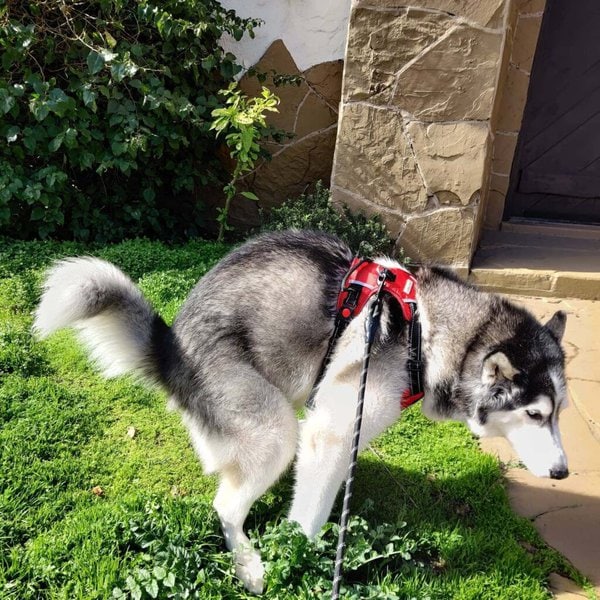
What Causes Dogs To Be Constipated?
Swallowing Foreign Objects
Dogs tend to pick up lots of objects, and consequently, one of the most common causes of constipation in pooches is swallowing indigestible objects; These include objects such as hair, grass, stones, sticks, and the likes.
Poor Diet
Fiber plays an important role in the digestion process in pooches. And a dog that’s constantly fed meals with an inadequate fiber level is prone to suffering constipation.
Also, water plays an important role in the excretion process, and a dehydrated dog may find it difficult to poop with ease.
Inadequate Exercise
Regular exercising helps keep a doggie’s bowels moving, and makes pooping relatively easy for such a pooch. Consequently, a doggie that’s not getting regular exercise and playtime will most likely have constipation.
Age
For certain reasons, the older a dog is, the more liable such a pooch is to suffer from problems of constipation. Constipation in older dogs is typically caused by a prostate enlargement or a lack of electrolytes.
Other Causes Of Constipation In Dogs
Apart from the causes listed above, other factors responsible for constipation in dogs include:
- Use of medication such as diuretics, antihistamines, antacids
- Central nervous disorders
- An enlarged prostate
- Problems with the anal gland
- Surgical procedures
- Environmental stress
- Hormonal imbalances, among others
Additionally, dog constipation may also be a symptom of a more serious medical condition such as cancer or kidney disease.
How Do You Know If Your Dog Has A Blockage?
Common signs of constipation in dogs include:
- Straining to poop
- Excessive circling and pacing
- Frequent squatting
- Lack of appetite
- Bloody stool
- Failure to defecate for a few days
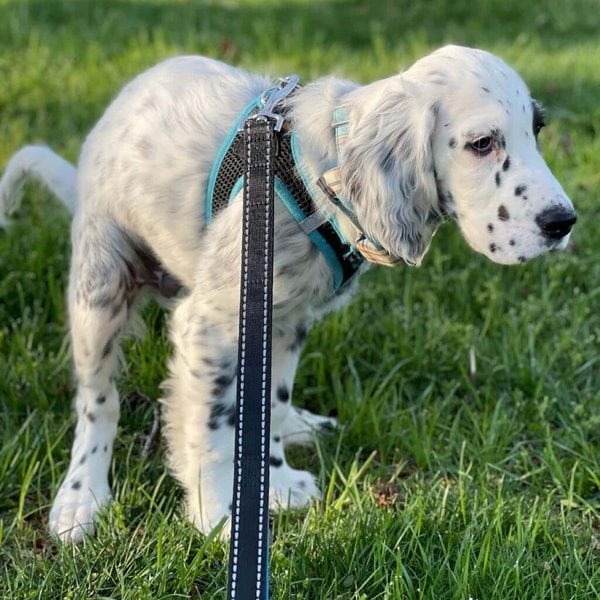
What Happens If Your Dog Can’t Poop?
Apart from an immediate inability to poop, there are health risks associated with constipation in dogs that may ultimately prove to be dangerous, if left unattended. And the most notable dangers of failure to poop by a dog include:
Obstipation
Obstipation in dogs occurs when feces present in the colon becomes hard and dry, hence, becoming extremely difficult to move. Consequently, dry feces accumulate in the colon over time, and this results in another medical condition called megacolon, in which the doggie is unable to poop.
Also, if left unattended, the inability of a dog to poop may result in:
- The doggie becomes depressed.
- Bloating and unhealthy weight gain.
- Enlargement of the colon.
- Loss of appetite.
How Many Times In A Day Should A Dog Poop?
Now that we know what happens when a dog’s constipation is left untreated, what do we consider to be healthy doggie pooping frequency?
Generally, most dogs will need to poop just once a day, but it isn’t unusual for doggies to need to use the toilet, twice or thrice a day. Ultimately, the frequency with which a dog will need to be led out to use the toilet in a day depends on its diet, size, and activity level.
If your doggie fails to poop for two days straight, you need to sit up and be on the lookout for other signs of canine constipation. And this will decide whether a simple home remedy will suffice or if your furry friend requires medical attention.
What Happens After Treatment Of Constipation?
On a positive note, the general prognosis for dog constipation is quite encouraging, and pooches that get the required medical attention and care, typically bounce back to enjoy their best lives.
Doggies suffering constipation due to an underlying health condition also go on to make a speedy recovery, once the aforementioned health condition has been dealt with.
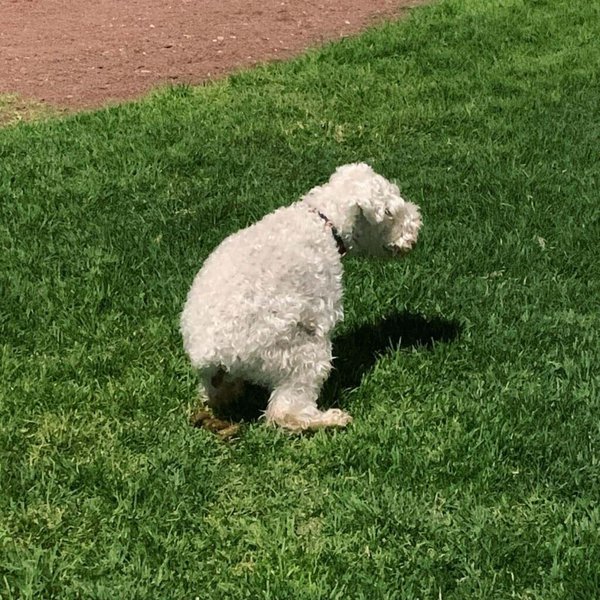
Related Questions
Do Dogs Poop Every Time They Eat? Yes, dogs do poop every time they eat. However, it is not usually the case that a dog poops immediately after eating, and it may be until hours after its meal before a pooch may need to use the toilet. On average, an adult dog may need between six to eight hours after a meal to poop. Puppies, on the other hand, only need four hours after a meal to poop.
Why Is My Dog Not Pooping Outside? Your dog may not poop outside either because it’s raining, due to poor potty training, or due to underlying medical conditions. Additionally, your dog may refuse to go poop outside simply because it doesn’t like the cold feel of grass or the fear and anxiety of being outside.
Do Dogs Poop Less On Chicken And Rice? Boiled chicken and rice can be easily digested by pooches, hence why dogs on a chicken and rice diet poop less than those fed with kibble. Consequently, dogs suffering from an upset stomach are typically placed on a chicken and rice diet in a bid to reduce the production of stool.

